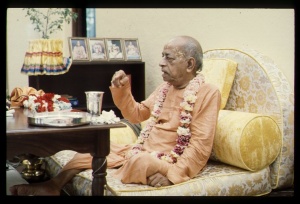CC Adi 14.22 (1975): Difference between revisions
(Vanibot #0027: CCMirror - Mirror CC's 1996 edition to form a basis for 1975) |
(Vanibot #0020: VersionCompareLinker - added a link to the Version Compare feature) |
||
| Line 2: | Line 2: | ||
<div style="float:left">'''[[Sri Caitanya-caritamrta (1975)|Śrī Caitanya-caritāmṛta (1975)]] - [[CC Adi (1975)|Ādi-līlā]] - [[CC Adi 14 (1975)|Chapter 14: Lord Caitanya's Childhood Pastimes]]'''</div> | <div style="float:left">'''[[Sri Caitanya-caritamrta (1975)|Śrī Caitanya-caritāmṛta (1975)]] - [[CC Adi (1975)|Ādi-līlā]] - [[CC Adi 14 (1975)|Chapter 14: Lord Caitanya's Childhood Pastimes]]'''</div> | ||
<div style="float:right">[[File:Go-previous.png|link=CC Adi 14.21 (1975)|Ādi-līlā 14.21]] '''[[CC Adi 14.21 (1975)|Ādi-līlā 14.21]] - [[CC Adi 14.23 (1975)|Ādi-līlā 14.23]]''' [[File:Go-next.png|link=CC Adi 14.23 (1975)|Ādi-līlā 14.23]]</div> | <div style="float:right">[[File:Go-previous.png|link=CC Adi 14.21 (1975)|Ādi-līlā 14.21]] '''[[CC Adi 14.21 (1975)|Ādi-līlā 14.21]] - [[CC Adi 14.23 (1975)|Ādi-līlā 14.23]]''' [[File:Go-next.png|link=CC Adi 14.23 (1975)|Ādi-līlā 14.23]]</div> | ||
{{CompareVersions|CC|Adi 14.22|CC 1975|CC 1996}} | |||
{{RandomImage}} | {{RandomImage}} | ||
==== TEXT 22 ==== | ==== TEXT 22 ==== | ||
| Line 11: | Line 10: | ||
<div class="verse"> | <div class="verse"> | ||
:krandanera chale balāila hari-nāma | :krandanera chale balāila hari-nāma | ||
:nārī saba | :nārī saba 'hari' bale,--hāse gaura-dhāma | ||
</div> | </div> | ||
| Line 18: | Line 17: | ||
<div class="synonyms"> | <div class="synonyms"> | ||
krandanera—of crying; chale—on the pretense of; balāila—caused to speak; hari-nāma—the holy name of the Lord; nārī—ladies; saba—all; | krandanera—of crying; chale—on the pretense of; balāila—caused to speak; hari-nāma—the holy name of the Lord; nārī—ladies; saba—all; 'hari' bale—chant the holy name of the Lord; hāse—laughs; gaura-dhāma—Lord Śrī Caitanya as a child. | ||
</div> | </div> | ||
| Line 32: | Line 31: | ||
<div class="purport"> | <div class="purport"> | ||
In the Caitanya-bhāgavata this pastime is described as follows: | In the Caitanya-bhāgavata this pastime is described as follows: "The Lord, with His beautiful eyes, would cry, but He would stop immediately upon hearing the Hare Kṛṣṇa mahā-mantra. When the ladies, understanding the fun of the Lord, discovered that He would cry and then stop upon hearing the chanting of the Hare Kṛṣṇa mantra, they all took it as a clue to chant Hare Kṛṣṇa as soon as the Lord cried. Thus it became a regular function. The Lord would cry, and the ladies would begin chanting the Hare Kṛṣṇa mahā-mantra, clapping their hands. In this way all the ladies of the neighboring houses would assemble in the home of Śacīmātā to join in the saṅkīrtana movement twenty-four hours a day. As long as the ladies continued to chant the Hare Kṛṣṇa mahā-mantra, the Lord would not cry but very pleasingly smile upon them." | ||
</div> | </div> | ||
Latest revision as of 15:17, 26 January 2020

A.C. Bhaktivedanta Swami Prabhupada
TEXT 22
- krandanera chale balāila hari-nāma
- nārī saba 'hari' bale,--hāse gaura-dhāma
SYNONYMS
krandanera—of crying; chale—on the pretense of; balāila—caused to speak; hari-nāma—the holy name of the Lord; nārī—ladies; saba—all; 'hari' bale—chant the holy name of the Lord; hāse—laughs; gaura-dhāma—Lord Śrī Caitanya as a child.
TRANSLATION
The Lord caused all the ladies to chant the holy names of the Hare Kṛṣṇa mahā-mantra on the plea of His crying, and while they chanted the Lord would smile.
PURPORT
In the Caitanya-bhāgavata this pastime is described as follows: "The Lord, with His beautiful eyes, would cry, but He would stop immediately upon hearing the Hare Kṛṣṇa mahā-mantra. When the ladies, understanding the fun of the Lord, discovered that He would cry and then stop upon hearing the chanting of the Hare Kṛṣṇa mantra, they all took it as a clue to chant Hare Kṛṣṇa as soon as the Lord cried. Thus it became a regular function. The Lord would cry, and the ladies would begin chanting the Hare Kṛṣṇa mahā-mantra, clapping their hands. In this way all the ladies of the neighboring houses would assemble in the home of Śacīmātā to join in the saṅkīrtana movement twenty-four hours a day. As long as the ladies continued to chant the Hare Kṛṣṇa mahā-mantra, the Lord would not cry but very pleasingly smile upon them."